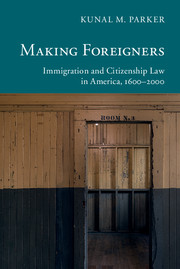Book contents
- Frontmatter
- Contents
- Preface and Acknowledgments
- 1 Introduction
- 2 Foreigners and Borders in British North America
- 3 Logics of Revolution
- 4 Blacks, Indians, and Other Aliens in Antebellum America
- 5 The Rise of the Federal Immigration Order
- 6 Closing the Gates in the Early Twentieth Century
- 7 A Rights Revolution?
- 8 Conclusion and Coda
- Bibliographic Essay
- Index
4 - Blacks, Indians, and Other Aliens in Antebellum America
Published online by Cambridge University Press: 05 September 2015
- Frontmatter
- Contents
- Preface and Acknowledgments
- 1 Introduction
- 2 Foreigners and Borders in British North America
- 3 Logics of Revolution
- 4 Blacks, Indians, and Other Aliens in Antebellum America
- 5 The Rise of the Federal Immigration Order
- 6 Closing the Gates in the Early Twentieth Century
- 7 A Rights Revolution?
- 8 Conclusion and Coda
- Bibliographic Essay
- Index
Summary
Introduction
Beginning in the 1820s, although citizenship remained in most important respects shaped at the state level, a new substantive sense of membership in a national community slowly came into being and began to receive judicial recognition. In the late eighteenth and early nineteenth centuries, the Privileges and Immunities Clause of the U.S. Constitution, which provided that “the Citizens of each State shall be entitled to all Privileges and Immunities of Citizens in the several States,” had meant simply that states could not discriminate against citizens of other states by imposing special disabilities on them. But in Corfield v. Coryell (1823), Justice Bushrod Washington read the Clause as giving rise to a notion of national citizenship possessed of a substantive core of uniform “fundamental” privileges. He listed some of the most important as follows:
Protection by the government; the enjoyment of life and liberty, with the right to acquire and possess property of every kind, and to pursue and obtain happiness and safety; subject nevertheless to such restraints as the government may justly prescribe for the general good of the whole. The right of a citizen of one state to pass through, or to reside in any other state, for purposes of trade, agriculture, professional pursuits, or otherwise; to claim the benefit of the writ of habeas corpus; to institute and maintain actions of any kind in the courts of the state; to take, hold and dispose of property, either real or personal; and an exemption from higher taxes or impositions than are paid by the other citizens of the state; may be mentioned as some of the particular privileges and immunities of citizens, which are clearly embraced by the general description of privileges deemed to be fundamental: to which may be added, the elective franchise, as regulated and established by the laws or constitution of the state in which it is to be exercised.
The most cursory examination of this list of the “fundamental” privileges of citizenship suggests that one or more of them were unavailable to the vast majority of the United States’ native-born population. Even as talk of a substantive national citizenship was growing, the country's native-born population continued to be slotted, at the federal and state levels, into a variety of legal statuses.
- Type
- Chapter
- Information
- Making ForeignersImmigration and Citizenship Law in America, 1600–2000, pp. 81 - 115Publisher: Cambridge University PressPrint publication year: 2015

